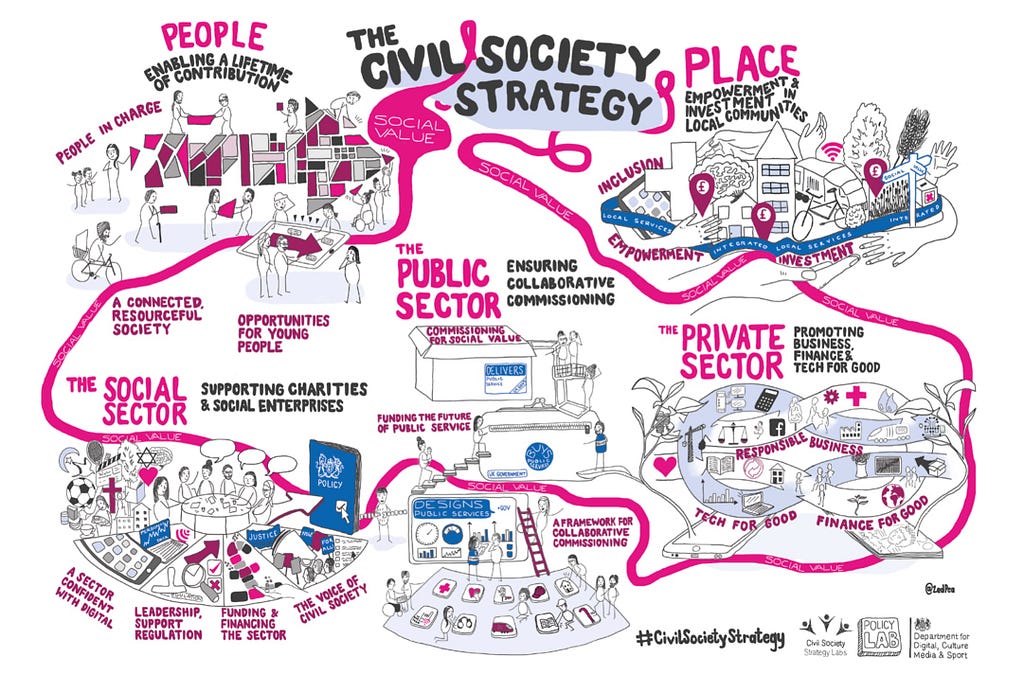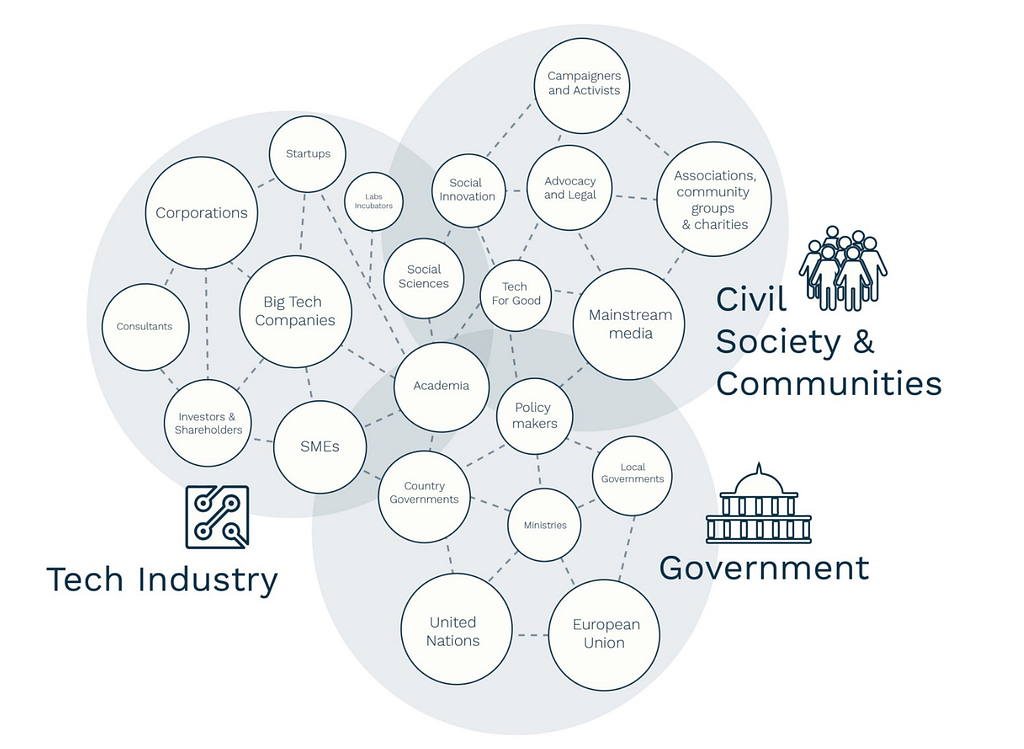We ❤️ the Social Sector

A few months ago we were involved in some roundtables with DCMS, and the Office of Civil Society, to help shape the new civil society strategy, which was released on Thursday. It’s been great to see the energy forming around this over the last months and the fact that this is the first strategy for civil society, from Government, in 15 years, feels quite pointed. It couldn’t come sooner!
The value of the social sector is very clear to us at Doteveryone. Responsible technology toolkits mean nothing in the abstract — the social sector (or society) is the context in which all of our work ultimately plays out and the reason for wanting responsible technology to be the new normal. We talk about a fairer internet but we only care about that because we care about a fairer society.
“The strategy sets out how government will work with and support civil society in the years to come, so that together we can build a country that works for everyone.”
Strengthening the social sector
The strategy as a whole represents the government’s commitment to strengthening the social sector. It makes sense to recognise that for communities to thrive, “people, places, the social sector, the private sector, and the public sector” need to be seen as a collective entity that all have responsibility, and that all need to work together.
Society In The Loop
At Doteveryone we’ve been focussing some of our work on building the social sectors’s capacity to have a voice on issues that will most affect society. After all, the voice of civil society has throughout history been at least as important as its service delivery role. In particular, given Doteveryone’s mission, we want to ensure the social sector has a leading voice and prominent role in directing the impacts of technology on our society, and is more aware of and resilient to the unintended consequences of technological advance.
Our Society In The Loop conference in September is part of this work — bringing together social sector organisations, with the technology industry and with social scientists. We hope that social sector organisations will leave the day feeling more confident (and more fired up!) to participate in those conversations that too often are only happening between industry (the large tech companies all have well resourced policy teams) and Westminster.
Consequences as well as opportunities
It was great to see the strategy have such a strong focus and be in such strong support of the Tech For Good community here in the UK, as well as making a commitment to growing the use of, and confidence with digital, across the sector. Alongside this though, the government does need to encourage the sector to look ahead too, to be able to respond to the needs (and opportunities and possibilities) society has now, whilst being resilient for the future – aware of and engaged in the potential negative aspects of technology, what it can displace, and the unexpected consequences that can come from its cumulative affects.
After all, as became clear from our Digital Attitudes survey, whilst individuals felt that the Internet has mostly been positive for them, they don’t believe it’s had a positive impact on society as a whole.
We need the wisdom and expertise of the social sector to help maximise the benefits of technology for the whole of society while minimising any potential harms.
Digital Understanding
The strategy talks about creating “a social sector confident with digital” which will be important for the public too. There are some new initiatives being launched like an Innovation in Democracy programme (which I’m excited to be on the advisory panel for) — this is ultimately about citizens having more say and being able to participate in and shape the world around them. This is empowering stuff and yet for the public to do this they need to have a far greater understanding of the powers that are really at play– technology being one of the greatest.
If we want people to get involved with making trade-offs and taking part in community decision-making, then people also need to understand the implications of technology, they need to have greater digital understanding, as well as greater literacy around power too.
We’ve started to experiment with how to do this at Doteveryone through our public engagement work, our digital public health campaign and in developing our Digital Understanding framework, but these were single experiments and Government needs to substantially invest in digital understanding and public engagement as much as it has in digital skills.

Responsible leadership
Another theme of the strategy is responsible business and responsible leadership. The idea that businesses need to be more responsible seems pretty uncontroversial but it’s helpful to be explicit about it.
“Our leading businesses increasingly put social and environmental responsibility at the heart of what they do. It is key to their strategies for long-term, sustainable value, including how they manage risk, and how they sustain public and investor trust in their brands and business models. Alongside this, a new generation of businesses now go further and commit themselves explicitly to social and environmental purposes or missions, alongside profit, in their goods, services and how they operate.”
Leadership is definitely an important part and at Doteveryone we’ve been prototyping a Responsible Leadership programme for the last year, with ACAS and now with the senior team at London City Hall. However within the strategy there needs to be a more specific ask for responsible practice around technology (how it’s built, invested in and the culture that surrounds it), as part of responsible business. At Doteveryone we’ve been developing our Responsible Tech Tool (and the 3 C’s of responsible technology) and placing emphasis on this will further the governments intentions “to hold businesses to account with ethical expectations of their products or global supply relationships.”
If the government’s vision “is one where responsible businesses will play a key role as a force for good in our society” then asking businesses to make specific commitments around how they use data, how they are automating decisions and how their business models work, needs to be added to the list below.
“A responsible business might be seen as one which:
• pays its fair share of tax
• aims for positive interactions and relationships with its employees, shareholders, customers, and suppliers
• is transparent and accountable to its shareholders
• is open and communicates what it does for society and the environment
• trades fairly with its customers and suppliers
• recognises the responsibilities it has to treat its employees fairly, including through levels of pay
• protects the natural environment from its impacts and uses resources sustainably
• genuinely invests in and becomes part of the communities in which it operates.”
I hope some of the people recruited to be on the “responsible business leadership group” (newly announced in the strategy) have good knowledge and understanding of technology and its implications!
People power and collective action
It was good to see recognition for and investment in collective action and movement building in the strategy– people power is one of our levers for change at Doteveryone.
“ People taking action is the bedrock of a strong society. The emerging social and economic model of the future has responsible citizens at its heart: the 21st century needs ‘people power’ more than ever.”

Community organising and local action is important but we should also anticipate and design for new kinds of collective action that are not only already starting to be available to us, but that we will need.
Technology has created new shapes of problems – the invisibility of discrimination that sits within automated systems is just one of the ways that technology is demanding new awareness and action from us. We are also more of a collective in some ways — the Facebook and Cambridge Analytica incident showed how the choices of individuals and organisations around data sharing has implications for others that are linked to the data – data is usually about multiple people.
At Doteveryone we did an experiment around collective action with Citizens Advice, looking at how price discrimination could be exposed through multiple people sharing their data with a trusted institution. We think there are many more opportunities for collective action, to take the burden off individuals and to make more use of what technology affords.
Lastly
There was no mention of it in the strategy but there really needs to be a strong and collaborative relationship between the Office of Civil Society and the Centre for Data Ethics and Innovation — let’s make sure that happens!
We ❤ the Social Sector was originally published in Doteveryone on Medium, where people are continuing the conversation by highlighting and responding to this story.